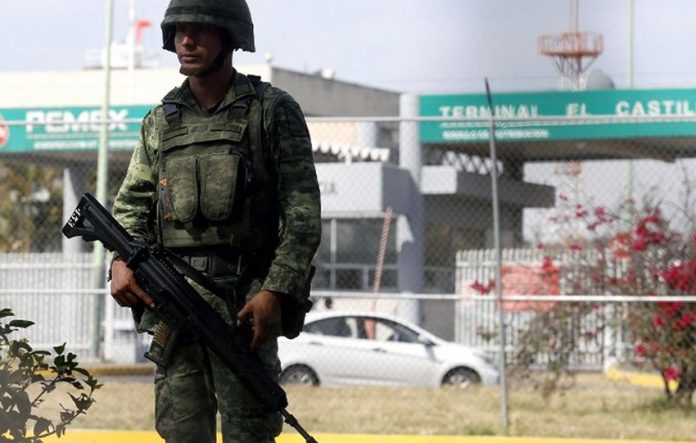An additional 4,000 troops will be deployed to safeguard Pemex pipelines against theft, President López Obrador announced today.
Around 4,000 soldiers and marines are already guarding Mexico’s oil refineries and other facilities operated by the state oil company as part of the federal government’s anti-fuel theft strategy.
“We’re going to strengthen surveillance of 1,600 kilometers of pipelines . . . the six main pipelines. We’re going to continue to implement the actions that are necessary . . .We’re going to confront this scourge,” López Obrador told reporters at his daily press conference at the National Palace in Mexico City.
He said that surveillance bases will be set up along the pipeline network from which the military will carry out their anti-fuel theft operations.
López Obrador also called on people complicit with fuel thieves known as huachicoleros to stop supporting the crime.
“I ask the members of the communities and the towns through which the pipelines run to help us. If before, due to a lack of opportunities, you collaborated with those who devote themselves to stealing fuel, don’t do it anymore, don’t be complicit,” he said.
“Things have changed now. Public servants don’t steal the people’s money anymore and nobody should dedicate themselves to robbery. If you earned income by participating in illegal activities, now you’ll get those same resources in a clean way through [government] programs and scholarships,” the president added.
López Obrador has made combating fuel theft, which costs public coffers billions of pesos a year, an early priority for his government.
But the decision to close off pipelines and instead make greater use of tanker trucks to transport fuel has caused a gasoline shortage crisis that has now affected at least 10 states.
The shortage has extended to Mexico City, where long lines of concerned motorists have been seen at gas stations yesterday and today.
López Obrador said this morning that “the gasoline shortage problem in Mexico City was caused because there was a sabotage of a pipeline . . . between Tuxpan [Veracruz] and Azcapotzalco,” a northern borough in the capital.
“It was already repaired, last night it was working until 10, we had anticipated that at five in the morning today we would be able to regularize supply but at 10 last night the pipeline was damaged again,” he added.
However, the president said there is enough gasoline to meet demand in Mexico City, explaining that it only needs to be distributed to gas stations.
He reiterated that the shortage in some parts of the country is due to logistics rather than supply and asserted that the problem would soon end.
“. . . There’s no problem with supply and soon we’re going to resolve the shortage [problem] in some gas stations and distribution centers. We’re confident that everything is going to turn out well, the corrupt will not defeat us,” López Obrador said.
According to the Secretariat of Energy (Sener), low fuel inventories in some parts of the country and declining oil production have also contributed to the gasoline shortage.
Pemex has been unable to replenish reserves quickly enough to prevent the shortages in several states from occurring because they don’t have enough tanker trucks.
Source: El Universal (sp), Animal Político (sp), El Economista (sp)
